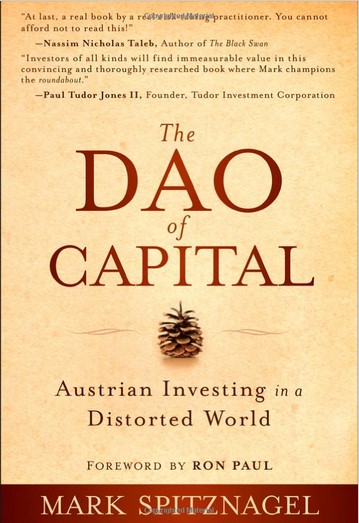The Dao of Capital Summary
5 min read ⌚
 Austrian Investing in a Distorted World
Austrian Investing in a Distorted World
If you don’t know how to manage your finances and allocate your capital, The Dao of Capital Summary will probably give you a few hints.
Don’t shy away from risk-taking, and exploit your potential.
Who Should Read “The Dao of Capital”? And Why?
In all honesty, “The Dao of Capital” is best-equipped for students, economists, and experts in the world of investments.
Although Mark welcomes anyone, you need a little of bit of previous knowledge to break the entry barriers and grasp the idea.
About Mark Spitznagel
 Mark Spitznagel is a stocks and commodities trader, an author and fund manager, born on March 5th, 1971 in Michigan. His forecasting abilities in the realm of investing granted him respect and public recognition.
Mark Spitznagel is a stocks and commodities trader, an author and fund manager, born on March 5th, 1971 in Michigan. His forecasting abilities in the realm of investing granted him respect and public recognition.
He is also the author of Safe Haven: Investing for Financial Storms.
“The Dao of Capital Summary”
The Dao of Capital is a book that surely gives a lot of attention to practices, common for the middle ages, and the transition from basic to globalized markets. Using examples from both East and the West, any reader will surely feel the immense heat, and pressure of “ruling” his own kingdom, his financial palace. In other words, you’ll be introduced to Austrian Investments, which are technically built on Dao foundations.
Mark, in the meantime, provides effective oversight of the system, and all the activities, processes and tasks that enable it to function.
Gain to lose!?
No, we are not going to dispatch any messages in a bottle, or through pigeons, but let’s go way back and start our story in the late 19th century. The Austrians, firstly discovered that economics had lots of room for progress, and thus a new way of thinking was established by them. Capital doesn’t merely represent a tool for gaining profits, but a quick turnaround which can also inflict prosperity, even at the cost of momentary loss.
Although Mark Spitznagel claims that this idea was born in Austria, the concept originates from ancient China. Daoism, by all means, unlike any other practice relies on the wisdom that is yet to be seen, yet to be analyzed and discovered.
Will the day of reckoning come?
Even if this Austrian-Chinese concept doesn’t seem appealing to you, give it one more try. In general, lose money to make money, will never be the first-choice for inexperienced investors. Nonetheless, the paradox is that before you make a living out of investing, you need to fulfill two basic criteria: hate to earn and love to lose money.
Long ago in a far-away land in ancient China, the legend of Daoism was born and tested. Since then, the idea never shifted or was adjusted throughout history because, its roots and elements are relevant regardless of the age.
Here’s what you should consider:
Austrian investors, amazed and thrilled by the potency that follows the Daoist model, embarked on a new financial adventure to resist the temptation of failing in despair after a loss, and or be overjoyed with gains. Instead, let’s twist the obvious into the unexpected and controversial.
Unlike common sense approaches, the quickest route to success is probably the way of risk, where one doesn’t back away from a temporary loss, or cash in on quick wins. Out of instinct, we are trained to operate on these two soils, but “The Dao of Capital Summary” can undoubtedly transform your mindset.
Hold your nerves, until you are in a better position as a negotiator, and win big time!
If the previous illustrations didn’t do the trick – The Robinson Crusoe parable sure will:
As one of the first settlers in remote wilderness, surrounded by water, Crusoe had no other choice than to start thinking about the basics survival elements.
The bottom line is, when Robinson started fishing, he spent countless of hours trying to fill his belly, but he didn’t manage to catch a single fish.
Get our point? – Or should we say Dao’s method?
Instead of going harder, he used its ingenuity and tried its patience to build not one but several improvised fishing tools that will give him the upper hand in the struggle for survival. As you probably assume, his effort bore fruits, even at the risk of dying out of starvation.
Key Lessons from “The Dao of Capital”
1. Any calculated risk will ultimately do the trick
2. Don’t be short-sighted
3. Divide and Conquer
Any calculated risk will ultimately do the trick
Eventually, your investment will pay off, and that’s the whole key because the name of the game is – long-term benefits. Ford, on the other hand, risked production for the upcoming months in order to improve the process. A risky move that ultimately brought the desired results.
As a consequence of that, every 24 seconds, Ford was able to deliver a brand-new car – an endeavor that stands for guts, and vision.
Don’t be short-sighted
Sometimes, quick losses are in fact win-win situations. Don’t judge too quickly because “losing” represents the foundation for long-term gains. It’s totally worth it! We highly doubt that you’ll end up stranded on a remote island, but the Crusoe’s vision should give you a clue of how essential the mindset can be in various environments, including the stock market – for example.
Divide and Conquer
Literally, any aspect of human culture can apply these laws, even in times of conflicts. The strategy consists of several methods that indicate – You should not provoke an attack or start one, until you are absolutely sure that you can turn the forces of your enemy, to operate against their current ruler. Tricky and efficient, even nowadays!
Like this summary? We’d Like to invite you to download our free 12 min app, for more amazing summaries and audiobooks.
“The Dao of Capital” Quotes
Because of the quirks of our human eagerness for the immediate reward, we are forewarned that what seems easy and straightforward is deceptively so; the roundabout is in practice a counterintuitive path—of acquiring later stage advantage… Share on X Although the future remains uncertain, the entrepreneur relies on “specific anticipative understanding,” which “can be neither taught nor learned”; he does not focus on what was or is, but acts upon what he expects the future to be. Share on X the roundabout is in practice a counterintuitive path—of acquiring later stage advantage through an earlier stage disadvantage—nearly impossible to follow. Share on X Blaming wild market volatility on the “animal spirits” of the herd mentality takes the focus off where it belongs: on the actions of the government. Instead of functioning as instruments of information, signaling to entrepreneurs how and… Share on XOur Critical Review
From time to time, we come across books that indeed prove to be life-altering – that’s the case with “The Dao of Capital” as well. Although this book doesn’t fall into the personal development category, it sure does carry the aura of hope.
Emir is the Head of Marketing at 12min. In his spare time, he loves to meditate and play soccer.


 Austrian Investing in a Distorted World
Austrian Investing in a Distorted World




